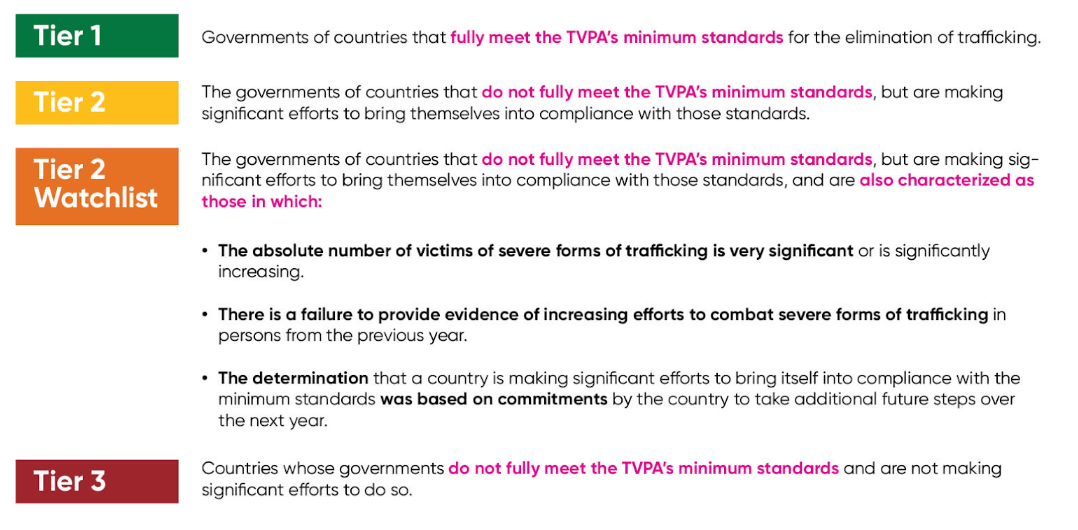Slavery was declared abolished in 1981 when Mauritania became the last country in the world to formally outlaw it, but 2023 numbers tell a different story: Today, on World Day Against Trafficking in Persons, an estimated 27.6 million people are trapped in modern slavery and 22 million in forced marriages around the world. And the numbers are rising.
Corruption and Complicity in Trafficking
The trafficking of persons is a “high profit-low risk” money-making venture. In 2022, human trafficking generated approximately $150 billion in revenue globally, up from previous estimates of $32 billion in the early 2000s. To facilitate this lucrative and transnational crime, traffickers invest in highly corrupt systems that, in turn, assist them in trafficking individuals and evading prosecution.
While there is little awareness of the nexus of corruption and human trafficking, studies have found that the two are closely linked criminal activities. Organized trafficking, whether for drugs, guns, or humans, requires systemic corruption to thrive. More often than not, paying corrupt officials is a main cost factor for traffickers.
Government officials at all levels are guilty of trafficking-related corruption. A border control officer could be bribed to allow traffickers to cross the border with their victims. An embassy worker could provide visas to a recruitment agency bringing in soon to be trafficked migrant workers. In the criminal justice system, police, prosecutors, and judges might ignore trafficking or even obstruct investigations into it. And parliamentarians and lawmakers can be bought, detering the adoption of meaningful anti-trafficking legislation.
In some states, the regime itself perpetrates trafficking for profit. Since the 1960s, the Cuban dictatorial regime has profited from an elaborate “medical missions” program. Through this program, the regime charges foreign governments for the work performed by Cuban medical professionals, giving them only a tiny portion of devalued Cuban pesos. Once in the program, workers often have their passports withheld and face long working hours, poor living conditions, and restrictions in their movement. The Cuban regime retaliates against those who try to leave the program, threatening family members, criminal penalties, and exile. Any medical professional that “deserts” the program can face eight years in prison or an eight-year ban from Cuba.
Cuba has expanded the program in recent years to “earn hard currency,” amounting to an estimated $6 to 8 billion annually. The regime’s continued exploitation of its medical professionals is bolstered by its state enterprises and the support of accomplices, participants, sponsors, and promoters globally. Despite widespread recognition of this exploitation, many countries continue to pay for Cuban doctors. Even democracies are complicit in the program. Recently, Portugal announced it would accept an additional 300 Cuban doctors to bolster its national healthcare system.
Across the ocean in the Arab States region, trafficking and forced labor are rampant. Migrant workers, comprising 40% of the labor, may enter one of the countries with the aid of a recruitment agency, which then charges excessive fees or provides a labor card for a position the worker never agreed to. Once in their new position, the workers may face lower than promised wages, long work hours, poor working conditions, or abuse.
In Arab States with the kafala system, the immigration status of migrant workers is tied to their employer or sponsor. This increases vulnerability to trafficking by tenfold. A worker may not leave their employer without approval, and employers may withhold the worker’s travel documents. The workers can’t turn to the police or embassies for fear of deportation or retaliation from their employers.
Similar to Cuba, these countries’ governments retaliate against exploited workers who don’t comply. For example, Qatar’s hosting of the 2022 FIFA World Cup, a decision itself rife with corruption, led to an increased labor demand to build the infrastructure needed for the event. In the lead-up to the World Cup, reports emerged of exploitative practices against migrant workers, many of whom spoke out against the abuses, arrest, detention, and deportation they faced.
This included Kenyan migrant workers’ rights activist Malcolm Bidali, who spoke about his experiences as a migrant worker in Qatar at the 2023 Oslo Freedom Forum (OFF). When he exposed these abuses through an anonymous Twitter account, the Qatari regime unmasked his identity, detained him, and placed him in solitary confinement for a month without access to a lawyer. He was charged with “broadcasting and publishing false news with the intent of endangering the public system of the state,” fined, and deported to Kenya.
Bidali called the situation “the immunity of the elites,” adding that regimes like Qatar know exactly who was smuggling, who was trafficking, and who was accepting bribes. Unfortunately, he said those who are trafficked can do little when there is fear of retaliation. For those who face poverty, the risk of trafficking may be worth it when there are few opportunities in their home countries. This is similar in Cuba, where local medical professionals have little opportunity to earn a living and turn to the medical missions program in the hope of a better life.
The Role of Authoritarianism
While human trafficking occurs everywhere, it especially thrives in countries with authoritarian regimes — like Qatar, where corruption is widespread and the rule of law is weak. In these regimes, corruption and trafficking feed into each other. Corruption weakens institutional safeguards protecting democratic processes and human rights. The proceeds of trafficking, in turn, fuel more kickbacks, continuing the cycle of corruption.
In countries without the rule of law or access to a sound judicial system, people are also less likely to report crimes like trafficking due to lack of trust in the institutions and fear of reprisals. Corrupt officials facilitating trafficking are typically not punished, and those found to be accepting bribes are often only temporarily suspended or transferred to a different post rather than prosecuted. These factors allow traffickers to operate with impunity.
Authoritarian regimes perpetuate trafficking through weak anti-trafficking efforts. HRF’s 2023 report, “Authoritarianism and Trafficking in Persons,” found democracies were more likely to make efforts to combat human trafficking, while authoritarian regimes were less likely to; this is a trend that HRF has found consistent since 2018. Using the tier rankings of the 2022 US Department of State’s Trafficking in Persons (TIP) reports, HRF found that 90% of Tier 1 countries — those making active efforts to combat trafficking — were democratic. Meanwhile, 100% of Tier 3 countries — those making little to no effort to combat trafficking — were authoritarian.
This trend continued in HRF’s analysis of the 2023 TIP report, which found that 83% of Tier 1 countries were democratic, while 95% of Tier 3 countries were authoritarian.

Aligning Efforts for Change
With the connection clear, corruption and authoritarianism must be prioritized to holistically address and combat trafficking. In addition to improving civil rights and promoting good governance, anti-corruption and anti-trafficking efforts must be in harmony. This includes incorporating corruption provisions in anti-trafficking legislation, including information on corruption in trafficking trainings, and strengthening whistle-blower mechanisms.
Experts in this field stress the need for further research into these policies. Jennifer Sarvary Bradford, a Crime Prevention & Criminal Justice Officer at the UNODC, for example, emphasized the importance of data collection at OFF 2023. Understanding the push and pull factors behind corruption and trafficking are crucial to properly addressing the issues. This information can empower civil society organizations and others to raise awareness and advocate for change.
Ben Skinner, founder of Transparentem, argued at OFF 2023 for holding corporations accountable alongside corrupt governments. Many corporations are equally complicit, using, for example, forced labor in places such as the Uyghur Region.
Democracies play a crucial role in pressuring authoritarian regimes and complicit corporations. Buying into Cuba’s medical missions or importing goods made with forced labor allows corruption-run trafficking schemes to prosper.
As Bidali said at the Forum, slavery will continue to exist as long as there are cheaper ways to do things. Currently, the risks and costs are worth the profits to traffickers. Corruption allows traffickers to continue profiting from human lives without consequences. To end modern slavery, democratic governments, civil society, and private corporations must prioritize and align efforts to ensure the risk is no longer worth the cost.
